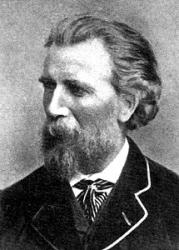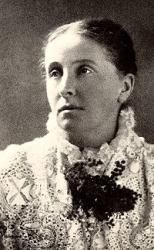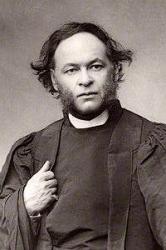Planning worship?
Check out our sister site, ZeteoSearch.org,
for 20+ additional resources related to your search.
- |
User Links
Person Results
‹ Return to hymnal





Export as CSV
S. L. Findlater
1823 - 1907 Person Name: S. B. Findlater Hymnal Number: 145 Translator of "Rejoice, all ye believers" in Hymns of Worship and Service (15th ed.) Sarah Laurie Borthwick Findlater United Kingdom 1823-1907. Born in Edinburgh, Scotland, sister of Jane Laurie Borthwick, she married Erick John Findlater, a pastor in the Free Church of Scotland at Lochearnhead, Perthshire, and they had three daughters: Sarah Jemima, Mary Williamina, and Jane Helen. Findlater and her sister Jane's translations were collected in “German hymns from the land of Luther”, appearing in four volumes (1854-1862). As an author, Sarah wrote fiction, juvenile works, music scores, anthems, and musical parts. She died at Torquay, Devon, England.
John Perry
S. L. Findlater
Jemima Luke

1813 - 1906 Hymnal Number: 453 Author of "I think, when I read that sweet story of old" in Hymns of Worship and Service (15th ed.) Luke, Jemima Thompson, the wife of Rev. Samuel Luke, an Independent minister of England, was the daughter of Thomas 422 Thompson, a philanthropist, and was born at Colebrook Terrace, Islington, August 19, 1813. When only thirteen years of age she began writing for the Juvenile Magazine. She published a volume titled The Female Jesuit in 1851 and A Memoir of Eliza Ann Harris, of Clifton, in 1859, but her name is known to the Christian world almost wholly through the one hymn found in this volume. Mrs. Luke died February 2, 1906.
I think when I read that sweet 682
Hymn Writers of the Church, 1915, Charles Nutter
===============
Luke, Jemima, née Thompson, daughter of Thomas Thompson, sometime of Bath, was born at Colebrooke Terrace, Islington, Aug. 19, 1813, and was married to the late Samuel Luke, a Congregational Minister, in 1843. She was an anonymous contributor to The Juvenile Magazine at the age of 13, and subsequently pub. several works, including The Female Jesuit, 1851; A Memoir of Eliza Ann Harris, of Clifton, 1859, &c. Mrs. Luke is known to hymnody through her hymn:—
I think when I read that sweet story of old. [The Love of Jesus.] It is recorded that this hymn was composed in a stage coach in 1841, and was designed for use in the village school, near her father's seat, Poundsford Park. It was published anonymously in the Leeds Hymn Book, 1853, No. 874, in 3 stanzas of 8 lines, and has since come into use through children's hymn-books in most English-speaking countries.
--John Julian, Dictionary of Hymnology (1907)
Jemima Luke
Edward Arthur Dayman
1807 - 1890 Person Name: E. A. Dayman Hymnal Number: 436 Author of "Sleep thy last sleep" in Hymns of Worship and Service (15th ed.) Dayman, Edward Arthur, B.D., 3rd son of John Dayman, of Mambury, N. Devon, born at Padstow in Cornwall, 11th July, 1807, and educated at Blundell's School, Tiverton, Devon, and Exeter College Oxon. 1st Class in Lit. Hum. 1829, B.A. 1830, M.A. 1831, B.D. 1841. He was for some time Fellow and Tutor of his College, and Pro-Proctor, 1835. Taking Holy Orders in 1835, he became successively examiner for University Scholarship for Latin, 1838; in Lit. Hum., 1838-1839, and 1841-1842, Sen. Proctor of the University 1840, Rector of Shilling-Okeford or Shillingstone, Dorset, 1842; Rural Dean, 1849; Proctor in Convocation, 1852; and Hon. Canon of Bitton in Sarum Cathedral, 1862. His works include Modern Infidelity, 1861, and Essay on Inspiration, 1864. He was joint editor with Lord Nelson and Canon (afterwards Bishop) Woodford of the Sarum Hymnal, 1868; which contains translations from the Latin, and original hymns by him; and with Canon Rich-Jones, of Statula et Comuetudines Ecclesiae Cathedralis Sarisburiensis, 1883. He also contributed several translations from the Latin to The Hymnary, 1872. He has been for many years engaged in compiling an English Dictionary of Mediaeval Latin founded on Du Cange. The original hymns contributed by him to the Sarum Hymnal,1868, are, with the dates of their composition, as follows:
1. Almighty Father, heaven and earth, q.v. (1867) Offertory.
2. O Lord, be with us when we sail. (1865) For use at Sea.
3. O Man of Sorrows, Thy prophetic eye. (1865) Tuesday before Easter.
4. Sleep thy last sleep. (1868) Burial.
5. Upon the solitary mountain's height. (1866) Transfiguration.
6. When the messengers of wrath. (1867) During Pestilence and Famine.
7. Who is this with garments dyed? (1866) Monday before Easter.
-- John Julian, Dictionary of Hymnology (1907)
===============
Dayman, E. A., p. 28S, ii. He died at Shillingstone, Oct. 30, 1890.
--John Julian, Dictionary of Hymnology, Appendix, Part II (1907)
Edward Arthur Dayman
Gerald Massey

1828 - 1907 Person Name: G. Massey Hymnal Number: 350 Author of "His banner over me is love" in Hymns of Worship and Service (15th ed.) Massey, Gerald, was b. May 29, 1828, in the parish of Tring, Herts, was for some time on the staff of the London Atherneum, and frequently contributed to the Quarterly Review. He has published many volumes of poems. The following have been used as hymns:—
1. Jerusalem the golden! I languish for one gleam. [Heaven.] In the Sunday Magazine, May 1865, p. 7. In his Tale of Eternity, 1870, p. 235, it reads "I weary for."
2. Surrounded by unnumbered foes. [Christian Courage.] In his Tale of Eternity, 1870, p. 272.
3. There lives a voice within me. [God's Voice.] In his Ballad of Babe Christabel, 1854, p. 32, entitled "This world is full of beauty."
Mr. Massey died at South Norwood, London, Oct. 29,1907.
[Rev. James Mearns, M.A.]
--John Julian, Dictionary of Hymnology, New Supplement (1907)
=====================
Born: May 29, 1828, near Tring, Hertfordshire, England.
Died: October 29, 1907, at home, South Norwood Hill, London.
Buried: Southgate Cemetery, London.
Son of an illiterate canal boatman, Massey went to work for a silk manufacturer at age eight. After the factory burned down, Massey began work plaiting straw.
"Having had to earn my own dear bread by the eternal cheapening of flesh and blood thus early, I never knew what childhood meant. I had no childhood. Ever since I can remember, I have had the aching fear of want, throbbing heart and brow. The currents of my life were early poisoned, and few, methinks, would pass unscathed through the scenes and circumstances in which I have lived; none, if they were as curious and precocious as I was. The child comes into the world like a new coin with the stamp of God upon it…the poor man’s child [is] hustled and sweated down in this bag of society to get wealth out of it…so is the image of God worn from heart and brow, and day by day the child recedes devil-ward. I look back now with wonder, not that so few escape, but that any escape at all, to win a nobler growth for their humanity. So blighting are the influences which surround thousands in early life, to which I can bear such bitter testimony."
Despite his hard beginnings, Massey learned to read at a "penny school," with the Bible and Bunyan being his principal resources. Afterward he obtained access to Robinson Crusoe and a few Wesleyan tracts left at his cottage. These constituted his only sources until he went to London at age 15. With access to more reading material, he flourished, absorbing the classics and other influences. In 1849, Massey started a cheap journal, The Spirit of Freedom, written entirely by workingmen. He was fired from five different jobs for publishing it, but he was committed to the cause of the laborer. He eventually went on to publish poetry, as well. He is particularly known for his 6-volume trilogy on the origin of religions. His works include:
A Book of the Beginnings
The Natural Genesis
Ancient Egypt
Sources:
Julian, p. 1669
http://www.hymntime.com/tch/bio/m/a/s/massey_g.htm
Gerald Massey
William Hammond
1719 - 1783 Person Name: W. Hammond Hymnal Number: 17 Author of "Lord, we come before Thee now" in Hymns of Worship and Service (15th ed.) Hammond, William, B.A, born at Battle, Sussex, Jan. 6, 1719, and educated at St. John's College, Cambridge. In 1743 he joined the Calvinistic Methodists; and in 1745, the Moravian Brethren. He died in London, Aug. 19, 1783, and was buried in the Moravian burial-ground, Sloane Street, Chelsea. He left an Autobiography in Greek, which remains unpublished. His original hymns, together with his translations from the Latin, were published in his:—
Psalms, Hymns, and Spiritual Songs. To which is prefix'd A Preface, giving some Account of a Weak Faith, and a Full Assurance of Faith; and briefly stating the Doctrine of Sanctification; and shewing a Christian's Completeness, Perfection, and Happiness in Christ. By William Hammond, A.B., late of St. John's College, Cambridge. London: Printed by W. Strahan; and sold by J. Oswald, at the Rose and Crown in the Poultry, mdccxlv.
A few of his original hymns from scriptural fidelity and earnestness have attained to a foremost position amongst English hymns. These include, "Awake, and sing the song," and "Lord, we come before Thee now." His translations of Latin hymns were amongst the earliest published after those contained in the Primers and other devotional works of 16th and 17th centuries. They are of merit, and worthy of attention. Greater use might also be made of his original compositions. In addition to those named above, the following are also in common use:—
1. Brightness of the Father's Face. God the Son.
2. How great the Christian's portion is. Possession of All in Christ.
3. If Jesus is yours. God's unchangeable Love.
4. In Thine own appointed way. Divine Worship.
5. Jesus, Who died the [a] world to save. Easter.
6. Lord, if on earth the thought of Thee. Heaven anticipated.
1. Now with joint consent we sing. Divine Worship.
8. O Lord, how little do we know. Quinquagesima.
9. Would you win a soul to God ? The Gospel Message.
--John Julian, Dictionary of Hymnology (1907)
William Hammond
Ada Cambridge

1844 - 1926 Person Name: A. C. Cross Hymnal Number: 66 Author of "The dawn of God's dear Sabbath" in Hymns of Worship and Service (15th ed.) Cross, Ada, née Cambridge, daughter of Henry Cambridge, born at St. Germaine, Norfolk, Nov. 21, 1844, and married, in 1869, to George Frederick Cross, who, in 1870, took Holy Orders as a curate in England, and subsequently, after holding various curacies in Australia, became, in 1877, Incumbent of Coleraine, in the diocese of Ballarat. Her works include Hymns on the Holy Communion, 1866; Hymns on the Litany, 1865, &c.; and she has also contributed to Lays of the Pious Minstrels, 1862; English Lyrics, &c.; and published a prose story, "The Two Surplices,” 1865, and tales in various magazines. Her hymns have attained to some popularity, and are characterized by great sweetness and purity of rhythm, combined with naturalness and simplicity. The best known are:—
1. Humbly now with deep contrition. 1865. Lent.
2. Jesus, Great Redeemer. 1866. Holy Communion.
3. Light of the world, O shine on us. 1865. Domestic Worship.
4. Saviour, by [to] Thy sweet compassion. Lent.
5. The dawn of God's dear Sabbath, 1866. Sunday Morning.
--John Julian, Dictionary of Hymnology (1907)
Ada Cambridge
Hugh R. Haweis

1838 - 1901 Person Name: H. R. Haweis Hymnal Number: 418 Author of "The Homeland! O the Homeland! " in Hymns of Worship and Service (15th ed.) Born: April 3, 1838, Egham, Surrey, England.
Died: January 29, 1901, St. Marylebone, London, England.
Haweis’ father was John Oliver Willyams Haweis, Canon of Chichester. Hugh attended Trinity College, Cambridge, and after graduation served under Garibaldi in the Italian war of independence. He was ordained in 1861 and was curate at Bethnal Green, Westminster and Stepney. In 1866, he became perpetual curate at St. James, Marylebone. His works include:
Music and Morals, 1871
My Musical Life, 1884
Travel and Talk, 1897
Old Violins, 1898
--www.hymntime.com/tch
Hugh R. Haweis
W. Shrubsole
1759 - 1829 Hymnal Number: 31 Author of "When, streaming from the eastern skies" in Hymns of Worship and Service (15th ed.) William Shrubsole was born in Sheerness, Kent, in 1759. His first occupation was as a shipwright in Sheerness Dockyard, but he was promoted, and afterwards removed to London, where he at length held the position of Secretary to the Committee of the Treasury in the Bank of England. He died at Highbury, in 1829. Mr. Shrubsole was the author of several hymns, and some articles in the religious magazines of his day.
--Annotations of the Hymnal, Charles Hutchins, M.A. 1872.
=============================
Shrubsole, William, eldest son of William Shrubsole, a master mastmaker in the dockyard at Sheerness, Kent, and a Lay Preacher, was born at Sheerness, Nov. 21, 1759. In his earlier years he was engaged as a shipwright in the dockyard, and then as a clerk. In 1765 he removed to London, and entered the Bank of England as a clerk. He subsequently became the Secretary to the Committee of the Treasury. He died at Highbury, Aug. 23, 1829. Mr. Shrubsole was for some time a communicant at St. Anne's, Blackfriars, during the incumbency of the Rev. W.Goode; but during the last twenty years of his life he was a member with the Congregationalists, and attended the Hoxton Academy Chapel. He interested himself in religious societies, and especially the London Missionary Society (of which he became a director and one of the secretaries), the Bible Society, and the Religious Tract Society. He contributed hymns to the Evangelical Magazine, the Christian Magazine, the Theological Miscellany, the Christian Observer and the Youths' Magazine, at various dates, from 1775 to 1813. To these works we have traced nearly twenty of his hymns. A Memoir of Shrubsole was contributed by his daughter to Dr. Morison's Fathers and Founders of the London Missionary Society, 2 vols., London, Fisher, Sons & Co., 1844. Seven of his hymns are also given, together with a portrait, in the same work. His hymns in common use include:—
1. Arm of the Lord, awake, awake. Put on Thy strength, the nations shake. Missions. This appeared in Missionary Hymns, 1795; and in Morison's Fathers and Founders, &c, 1844, vol. i. p. 451, in 6 stanzas of 4 lines. Dr. Rogers in his Lyra Britannica, 1867, attributes this hymn to Shrubsole's father, and dates it 1780. Against this statement we can only put the fact that it is claimed in Morison for the son. Original text, Lyra Britanica, 1867, p. 502.
2. Bright as the sun's meridian blaze . Missions. Written Aug. 10, 1795, for the first meeting of the London Missionary Society. It was printed in the Evangelical Magazine, Sept., 1795, headed “On the intended Mission," and signed "Junior." It is also in Morison, 1844, i. p. 449, together with the note that the hymn "was duly acknowledged by Mr. Shrubsole in his lifetime, and the original manuscript, with numerous corrections, is in possession of his family, in his own autograph," and that it bears date "August 10, 1795." Original text Lyra Britanica, 1867, p. 504.
3. In all the paths my feet pursue. Looking unto Jesus. Appeared in the Evangelical Magazine, 1794; in Morison, i., 1844, p. 454; and Lyra Britanica, 1867, p. 503.
4. Shall science distant lands explore? Missions. Published in the Evangelical Magazine, 1795; and again in Morison, 1844, i. p. 452.
5. When streaming from the Eastern skies . Daily Duties; or, Morning. Published in the Christian Observer, Aug., 1813, in 8 stanzas of 8 lines, headed "Daily Duties, Dependence and Enjoyment," and signed Probus. Also in Morison, 1844, i. p. 453; and Lyra Brittanica, 1867, p. 505. The well-known cento, "As every day Thy mercy spares," is from this hymn, and begins with st. iii.
6. Ye saints, your grateful praises bring
W. Shrubsole
Henry Twells

1823 - 1900 Person Name: H. Twells Hymnal Number: 113 Author of "At even, ere the sun was set" in Hymns of Worship and Service (15th ed.) Twells, Henry, M.A., was born in 1823, and educated at St. Peter's College, Cambridge. B.A. 1848, M.A. 1851. Taking Holy Orders in 1849, he was successively Curate of Great Berkhamsted, 1849-51; Sub-Vicar of Stratford-on-Avon, 1851-54; Master of St. Andrew's House School, Mells, Somerset, 1854-56; and Head Master of Godolphin School, Hammersmith, 1856-70. In 1870 he was preferred to the Rectory of Baldock, Herts, and in 1871 to that of Waltham-on-the Wolds. He was Select Preacher at Cambridge in 1873-74, and became an Honorary Canon of Peterborough Cathedral in 1884. Canon Twells is best known by his beautiful evening hymn, "At even ere the sun was set." He also contributed the following hymns to the 1889 Supplemental Hymns to Hymns Ancient & Modern:—
1. Glorious is Thy Name, O Lord. The Name of God.
2. Know ye the Lord hath borne away? Ascension.
3. Not for our sins alone. Plea for Divine Mercy.
4. The voice of God's Creation found me. The Word of God a Light.
-- John Julian, Dictionary of Hymnology (1907)
==================
Twells, H., p. 1189, i. Canon Twells was born on March 13, 1823, at Ashted, Birmingham, and died at Bournemouth, Jan. 19, 1900. His Memoir, by W. Clavell Ingram, D.D., was published in 1901. His Hymns and other Stray Verses, appeared in 1901i. From it the following additional hymns have come into common use:—
1. Spirit of Truth and Might, 'Tis Thou alone can teach. [Our Words.] On "The Responsibility of Speech," p. 26. In the Sunday School Hymnary, 1905.
2. The day of Pentecost is fully come. [Whitsuntide.] Usually the second stanza is taken as the opening of this hymn. In this form it is given as "Awake, 0 Lord, as in the days of old," in Hymns Ancient & Modern, 1904, the Sunday School Hymnary, 1905, and other collections.
--John Julian, Dictionary of Hymnology, New Supplement (1907)
Henry Twells


 My Starred Hymns
My Starred Hymns

